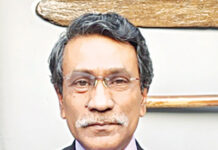SN Rasul
With the dire state of our two-lane highways, where overtaking is only slightly safer than playing Russian roulette, and the traffic mentality of our country as a whole, these numbers come as no surprise
The road to Bashundhara, for people living in and around the Ramna region, is a simple one. One straight road, going through Badda, Rampura, Progoti Shoroni, Nordda, and Notun Bazar, before leading to the flyover that takes you to Airport Road. It’s also served by a steady influx of buses — both “local” and otherwise — which show up regularly (more so than the “local” ones), and don’t stick around too long waiting for customers to jam pack the bus.
One of the buses that serve that route is the ironically titled Shuprobhat. Recently, I got on their bus at Mouchak, headed towards Bashundhara at about 6:30 in the morning. The roads were as empty as one can expect Dhaka to be, and usually, the ride takes me no more than 30 minutes (the same journey takes about an hour-and-a-half once the clock strikes eight).
The ride started off normally enough, but pretty soon, we, the passengers, realised that the driver was driving more erratically than was normal, even by Dhaka standards. Every time he would stop on the left of the road to pick up passengers, I saw, sitting on one of the seats closer to the front, looking back and then, as soon as another Shuprobhat bus came, he would swerve right, which would end up with both the buses colliding.
Granted, the buses weren’t colliding hard enough to cause any real physical damage, but it became clear to us that they were having some sort of feud. After the fifth or sixth time this happened, several of the passengers went up to the driver and started an altercation, both verbally and physically. The bus came to a standstill and I swiftly got off, unable to see the outcome reach fruition as I was in a hurry. The absolute disregard for human life (of others and their own) was, and is, terrifying.
This incident, though unusual, speaks for a general lack of accountability that the users of the road are eligible to. There is absolutely no real responsibility on the part of the drivers — be it of rickshaws, CNGs, private cars, taxis, tempos, motorbikes, trucks, and, of course, buses — and definitely none on the part of the traffic police.
Before I rage against the traffic police for their incompetence, a sentence or two must be dedicated to the insurmountable force that is the Bangladeshi traffic that they have to deal with. In weathers ranging from the fly-swatting, sweat-pouring, road-raging Bangladeshi summer, to the umbrella-upturning, God-weeping, apocalypse-calling Boishakhi jhor, they stand in the midst with nothing but an umbrella.
And the eternal outpour of the unwilling and unruly drivers is incessant. Relentlessly they come, packing in their arsenal an entire lifetime’s experience of following no rules, of caring little for the supposed sanctity of human life, and inserting themselves into every single crevice they find within traffic. Lanes aren’t maintained, seatbelts aren’t worn, horns are honked with unparalleled fervour, right turns are taken without indicators and without looking back, traffic lights are an urban myth, and even the hand of the traffic sergeant is barely enough to stop the flow of traffic in any given direction.
But despite that, the police aren’t doing enough to alleviate the problem. A stern warning, which is basically a gali or a baton in the back, will do absolutely nothing to prevent future instances of the crime. And an aptly generous bribe is usually enough if you’re in a private car. And if you have one of those VIP dandas on your petrol-guzzling, environment-ruining SUV? Fuggedaboutit.
Over the last week, which included the spectacularly organised occasion of Eid when, like every year, twice a year, people rushed and risked their lives to go to their hometowns, almost 100 people perished in road accidents across the country.
With the dire state of our two-lane highways, where overtaking is only slightly safer than playing Russian roulette, and the traffic mentality of our country as a whole, these numbers come as no surprise, and every day we embark on a dance with death, not knowing if this will be the day that death takes the lead and twirls us into non-existence.
We can be in the group that says that it is already too late, and that there is no solution for a nation that is about to implode under its own weight. We can say there aren’t enough roads, the Bengali mentality is corroding from the inside-out, that this entire country is too corrupt, its citizens to apathetic to really give two hoots about the matter. And usually, I would be with them. Most of the time, most of us feel the same.
But we can also be in the group that tries, tries to force the government and its people towards a solution. What that solution is — if it exists — perhaps no one knows, or we’re suffering from too much of a case of homeostasis to do anything about. It could be paying the traffic police better so that they do their jobs properly, harsher punishments for breaking traffic laws, decentralising the nation to reduce the strain on the city, proper driving tests, or all of these things.
Because the level of risk that each journey we start upon entails is getting ridiculous and unsustainable. And lives, in whatever form they come, and in whatever mode of transport, must matter.
Source: Dhaka Tribune










